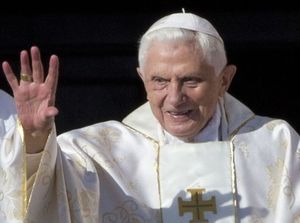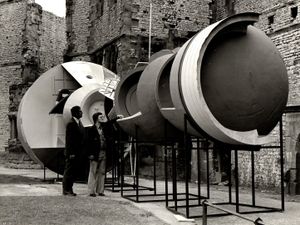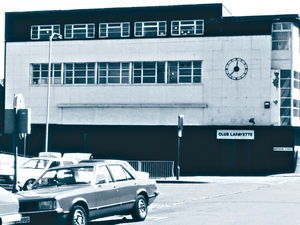Knowledge and belief – future hope: Dan Morris explores the link between two eminent anniversaries
Every day is history. Every date has a story to tell.

Tomorrow’s date will forever be a link between two eminent men from two different worlds – a bridge between the unlikely, and a conduit between the unexpected.
No date is ordinary, and no date is without significance.
Perhaps for quite different reasons, April 19 will be a date that history will always remember.
Firstly, and probably quite well known locally, tomorrow marks the 138th anniversary of the death of celebrated biologist Charles Darwin, whose theory of evolution changed scientific thinking the world over.
Born in Shrewsbury in 1809, Darwin was the fifth child of doctor and financier Robert Darwin and his wife Susannah – daughter of celebrated pottery magnate Josiah Wedgwood.
Darwin is most famous for his proposition that all species of life have descended over time from common ancestors – a proposition that contradicted the literal interpretation of the biblical story of creation in the Book of Genesis, that man was made in his current form by God.
Darwin published his famous theory of evolution along with supportive evidence in his now iconic 1859 work, ‘On the Origin of Species’.
By the 1870s, much of the scientific community and a large portion of the educated public had accepted the idea of evolution, though many favoured alternative explanations of the concept which only attributed a minimal role to Darwin’s core principle of ‘natural selection’.
This was a process by which it was suggested a species changes over time in response to changes in the environment, or competition between organisms, in order for the species to survive.
It was not until the emergence of the modern evolutionary synthesis from the 1930s to the 1950s that a consensus developed that natural selection was the basic mechanism of evolution.
It is now considered to be one of the cornerstones of modern biology.
Darwin had an interest in natural history from an early age. As a boy he was an engaged reader of nature books and reportedly spent much of his time collecting plants and insects from the fields and woodland around his Shropshire home.
Darwin joined the University of Edinburgh Medical School in 1825, though was reportedly disenchanted with the experience, often neglecting his studies.
His interest in nature continued however, and he joined the Plinian Society – a natural-history group that often engaged in debates that challenged orthodox religious views of science.
Darwin’s supposed lack of commitment to his medical studies irritated his father to the extent that he was sent to Christ’s College, Cambridge, to undertake studies that his father hoped would lead him to become an Anglican country parson.
After completing his studies at Cambridge, Darwin read a store of works pertaining to natural philosophy, and his desire to continue in the study of the natural world grew.
It was not long as such before he embarked on his famous voyage to South America aboard the HMS Beagle, where he would spend almost five years immersed in scientific pursuit, investigating geology and making natural history collections, all while keeping careful notes of his observations and speculations.
Darwin’s research during the voyage formed much of the building blocks for his later work, including the postulation of his revolutionary theory.
For many of the following years, and while establishing himself among scientific circles, the development of his theory on natural selection was something he constantly worked on in the background to his main occupation of writing on geology and publishing reports on the Beagle collections.
When, in 1859, On the Origin of Species was published, it proved unexpectedly popular, with reportedly the initial stock of 1,250 copies being oversubscribed.
Though the book did not explicitly discuss human origins, it included a number of hints regarding the animal ancestry of humans from which inferences could be made.
The work provoked scientific debate, and drew both intrigue and criticism.

The Church of England’s response was mixed, with certain members dismissing Darwin’s ideas but liberal figures choosing to interpret natural selection as an instrument of God’s design.
The Catholic Church delayed any official pronouncements for many decades, though Darwinian ideas would be discussed by Catholic scholars and the Vatican for generations to come.
Values
On April 19, 2005 – 123 years to the day since Darwin’s death – Cardinal Joseph Ratzinger was elected to succeed the popular Pope John Paul II, taking the papal name of Benedict XVI.
Born in Marktl, Germany, in 1927, Ratzinger had established himself as a highly regarded theologian by the late 1950s, and prior to his election as Pope he had been considered a major figure on the Vatican stage for a quarter of a century.
As Pope, he advocated a return to fundamental Christian values and also worked to revive a number of Catholic traditions. In a moment of great historical significance, he was the first Pope in nearly 600 years to resign from the position, and the first in 719 years to do so of his own volition.
Today, he is known by the title ‘Pope Emeritus’, and since his retirement has made occasional public appearances alongside his successor, Pope Francis.
Discussions on ideas proposed by Darwin had continued during the terms of his predecessors since that of Pius IX, who was Pope at the time that On the Origin of Species was first published.
Benedict XVI was an advocate of the idea that creation and evolution – rather than being contradictory concepts – were in fact complementary.
A view that he postulated was that Darwinian ideas of evolution offered an explanation as to the biological developments of the human race, while the story of creation – which Catholicism allowed to be viewed allegorically – offered insight into how God may have steered man’s particular nature, ‘inner origin’ and character.
The two therefore, were not mutually exclusive – evolution explained how man had biologically reached its current physical state, while creation explained how it could have been guided there by God, and how the human spirit may have had its origin in his design.
This was in line with the Catholic concept of ‘theistic evolution’ – that evolution can be seen as real, but was set in motion by God.
Catholic theology had allowed for biblical text to be read as allegorical even before Darwin, as a literal reading of the Book of Genesis had long been undermined by developments in geology and other scientific fields.
While Darwin’s work had drawn a sharp reaction from some members of the Catholic clergy at the time of its publication, the position of the Papacy had never been to directly contradict the basis of many of Darwin’s ideas, and through the terms of Benedict XVI’s numerous predecessors, discussion had continued, and views had, indeed, ‘evolved’.
Consequently, by 2007, Benedict XVI even went as far as to describe the conflict between the ideas of evolution and creation as “absurd”, in that both provided answers and insight to the same broader questions: Who are we? How have we come to be? Why are we here?
As Pope at the time of the 150th anniversary of On the Origin of Species, Benedict XVI was in office when two major conferences on evolution took place in Rome.
At these, there was generally confirmed to be a lack of conflict between evolutionary theory and Catholic theology.
Achievements
In shining a spotlight on these two men for whom tomorrow has so much significance, we are able to look in a broader sense at two of mankind’s greatest achievements – our development of knowledge, and our development of belief.
Darwin spent his life trying to add to knowledge, becoming one of its most eminent pioneers. Joseph Ratzinger spent his career trying to encourage belief, and as Pope Benedict XVI, became one of its most eminent ambassadors.
Knowledge and belief may not always lay as easy bedfellows. Darwin proved with his work that it is sometimes the job of one to challenge the other. Yet Benedict XVI reminded people that both can also be complementary.
Knowledge need not be science, and belief need not be faith in God or religion. But both knowledge and belief are key motivators to humanity, and can work in friction or with fluidity to drive us towards improvement.
And as we find ourselves on another historic April 19 – the one upon which the world was in the grip of the Covid-19 pandemic – we may take comfort in knowing that it will likely be mankind’s inherent desire to expand its knowledge, coupled with the resolve and power of its natural self-belief, that will lead it to find a way through to the end of this current time of crisis.





